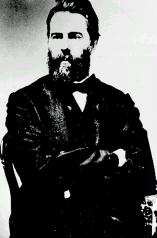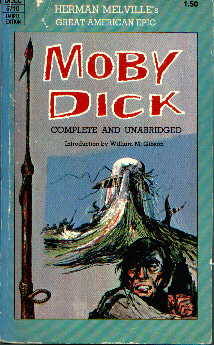FRtR > Outlines > American Literature > Democratic Origins and Revolutionary Writers, 1776-1820: Writers of fiction: Herman Melville (1819-1891)
An Outline of American Literature
by Kathryn VanSpanckeren
The Romantic Period, 1820-1860: Fiction: Herman Melville (1819-1891)
*** Index ***
 Herman Melville, like Nathaniel Hawthorne, was a descendant of an
old, wealthy family that fell abruptly into poverty upon the
death of the father. Despite his patrician upbringing, proud
family traditions, and hard work, Melville found himself in
poverty with no college education. At 19 he went to sea. His
interest in sailors' lives grew naturally out of his own
experiences, and most of his early novels grew out of his
voyages. In these we see the young Melville's wide, democratic
experience and hatred of tyranny and injustice. His first book,
Typee, was based on his time spent among the supposedly
cannibalistic but hospitable tribe of the Taipis in the Marquesas
Islands of the South Pacific. The book praises the islanders and
their natural, harmonious life, and criticizes the Christian
missionaries, who Melville found less genuinely civilized than
the people they came to convert.
Herman Melville, like Nathaniel Hawthorne, was a descendant of an
old, wealthy family that fell abruptly into poverty upon the
death of the father. Despite his patrician upbringing, proud
family traditions, and hard work, Melville found himself in
poverty with no college education. At 19 he went to sea. His
interest in sailors' lives grew naturally out of his own
experiences, and most of his early novels grew out of his
voyages. In these we see the young Melville's wide, democratic
experience and hatred of tyranny and injustice. His first book,
Typee, was based on his time spent among the supposedly
cannibalistic but hospitable tribe of the Taipis in the Marquesas
Islands of the South Pacific. The book praises the islanders and
their natural, harmonious life, and criticizes the Christian
missionaries, who Melville found less genuinely civilized than
the people they came to convert.

 Moby-Dick; or, The Whale, Melville's masterpiece, is the
epic
story of the whaling ship Pequod and its "ungodly,
god-like man,"
Captain Ahab, whose obsessive quest for the white whale Moby-Dick
leads the ship and its men to destruction. This work, a realistic
adventure novel, contains a series of meditations on the human
condition. Whaling, throughout the book, is a grand metaphor for
the pursuit of knowledge. Realistic catalogues and descriptions
of whales and the whaling industry punctuate the book, but these
carry symbolic connotations. In chapter 15, "The Right Whale's
Head," the narrator says that the Right Whale is a Stoic and the
Sperm Whale is a Platonian, referring to two classical schools of
philosophy.
Moby-Dick; or, The Whale, Melville's masterpiece, is the
epic
story of the whaling ship Pequod and its "ungodly,
god-like man,"
Captain Ahab, whose obsessive quest for the white whale Moby-Dick
leads the ship and its men to destruction. This work, a realistic
adventure novel, contains a series of meditations on the human
condition. Whaling, throughout the book, is a grand metaphor for
the pursuit of knowledge. Realistic catalogues and descriptions
of whales and the whaling industry punctuate the book, but these
carry symbolic connotations. In chapter 15, "The Right Whale's
Head," the narrator says that the Right Whale is a Stoic and the
Sperm Whale is a Platonian, referring to two classical schools of
philosophy.
Although Melville's novel is philosophical, it is also tragic.
Despite his heroism, Ahab is doomed and perhaps damned in the
end. Nature, however beautiful, remains alien and potentially
deadly. In Moby-Dick, Melville challenges Emerson's optimistic
idea that humans can understand nature. Moby-Dick, the
great
white whale, is an inscrutable, cosmic existence that dominates
the novel, just as he obsesses Ahab. Facts about the whale and
whaling cannot explain Moby-Dick; on the contrary, the facts
themselves tend to become symbols, and every fact is obscurely
related in a cosmic web to every other fact. This idea of
correspondence (as Melville calls it in the "Sphinx" chapter)
does not, however, mean that humans can "read" truth in nature,
as it does in Emerson. Behind Melville's accumulation of facts is
a mystic vision -- but whether this vision is evil or good, human
or inhuman, is never explained.
The novel is modern in its tendency to be self-referential, or
reflexive. In other words, the novel often is about itself.
Melville frequently comments on mental processes such as writing,
reading, and understanding. One chapter, for instance, is an
exhaustive survey in which the narrator attempts a classification
but finally gives up, saying that nothing great can ever be
finished ("God keep me from ever completing anything. This whole
book is but a draught -- nay, but the draught of a draught. O
Time, Strength, Cash and Patience"). Melvinne's notion of the
literary text as an imperfect version or an abandoned draft is
quite contemporary.
Ahab insists on imaging a heroic, timeless world of absolutes in
which he can stand above his men. Unwisely, he demands a finished
text, an answer. But the novel shows that just as there are no
finished texts, there are no final answers except, perhaps,
death.
Certain literary references resonate throughout the novel. Ahab,
named for an Old Testament king, desires a total, Faustian, god-
like knowledge. Like Oedipus in Sophocles' play, who pays
tragically for wrongful knowledge, Ahab is struck blind before he
is wounded in the leg and finally killed. Moby-Dick ends
with the
word "orphan." Ishmael, the narrator, is an orphan-like wanderer.
The name Ishmael emanates from the Book of Genesis in the Old
Testament -- he was the son of Abraham and Hagar (servant to
Abraham's wife, Sarah). Ishmael and Hagar were cast into the
wilderness by Abraham.
Other examples exist. Rachel (one of the patriarch Jacob's wives)
is the name of the boat that rescues Ishmael at book's end.
Finally, the metaphysical whale reminds Jewish and Christian
readers of the biblical story of Jonah, who was tossed overboard
by fellow sailors who considered him an object of ill fortune.
Swallowed by a "big fish," according to the biblical text, he
lived for a time in its belly before being returned to dry land
through God's intervention. Seeking to flee from punishment, he
only brought more suffering upon himself.
Historical references also enrich the novel. The ship
Pequod is
named for an extinct New England Indian tribe; thus the name
suggests that the boat is doomed to destruction. Whaling was in
fact a major industry, especially in New England: It supplied oil
as an energy source, especially for lamps. Thus the whale does
literally "shed light" on the universe. Whaling was also
inherently expansionist and linked with the idea of manifest
destiny, since it required Americans to sail round the world in
search of whales (in fact, the present state of Hawaii came under
American domination because it was used as the major refueling
base for American whaling ships). The Pequod's crew
members
represent all races and various religions, suggesting the idea of
America as a universal state of mind as well as a melting pot.
Finally, Ahab embodies the tragic version of democratic American
individualism. He asserts his dignity as an individual and dares
to oppose the inexorable external forces of the universe.
The novel's epilogue tempers the tragic destruction of the ship.
Throughout, Melville stresses the importance of friendship and
the multicultural human community. After the ship sinks, Ishmael
is saved by the engraved coffin made by his close friend, the
heroic tattooed harpooner and Polynesian prince Queequeg. The
coffin's primitive, mythological designs incorporate the history
of the cosmos. Ishmael is rescued from death by an object of
death. From death life emerges, in the end.
Moby-Dick has been called a "natural epic" -- a
magnificent
dramatization of the human spirit set in primitive nature --
because of its hunter myth, its initiation theme, its Edenic
island symbolism, its positive treatment of pre-technological
peoples, and its quest for rebirth. In setting humanity alone in
nature, it is eminently American. The French writer and
politician Alexis de Tocqueville had predicted, in the 1835 work
Democracy in America, that this theme would arise in
America as a
result of its democracy:
The destinies of mankind, man himself taken aloof from his
country and his age and standing in the presence of Nature and
God, with his passions, his doubts, his rare propensities and
inconceivable wretchedness, will become the chief, if not the
sole, theme of (American) poetry.
Tocqueville reasons that, in a democracy, literature would dwell
on "the hidden depths of the immaterial nature of man" rather
than on mere appearances or superficial distinctions such as
class and status. Certainly both Moby-Dick and
Typee, like
Adventures of Huckleberry Finn and Walden, fit this
description.
They are celebrations of nature and pastoral subversions of
class-oriented, urban civilization.
Available on the Internet
*** Index ***
 Herman Melville, like Nathaniel Hawthorne, was a descendant of an
old, wealthy family that fell abruptly into poverty upon the
death of the father. Despite his patrician upbringing, proud
family traditions, and hard work, Melville found himself in
poverty with no college education. At 19 he went to sea. His
interest in sailors' lives grew naturally out of his own
experiences, and most of his early novels grew out of his
voyages. In these we see the young Melville's wide, democratic
experience and hatred of tyranny and injustice. His first book,
Typee, was based on his time spent among the supposedly
cannibalistic but hospitable tribe of the Taipis in the Marquesas
Islands of the South Pacific. The book praises the islanders and
their natural, harmonious life, and criticizes the Christian
missionaries, who Melville found less genuinely civilized than
the people they came to convert.
Herman Melville, like Nathaniel Hawthorne, was a descendant of an
old, wealthy family that fell abruptly into poverty upon the
death of the father. Despite his patrician upbringing, proud
family traditions, and hard work, Melville found himself in
poverty with no college education. At 19 he went to sea. His
interest in sailors' lives grew naturally out of his own
experiences, and most of his early novels grew out of his
voyages. In these we see the young Melville's wide, democratic
experience and hatred of tyranny and injustice. His first book,
Typee, was based on his time spent among the supposedly
cannibalistic but hospitable tribe of the Taipis in the Marquesas
Islands of the South Pacific. The book praises the islanders and
their natural, harmonious life, and criticizes the Christian
missionaries, who Melville found less genuinely civilized than
the people they came to convert.
